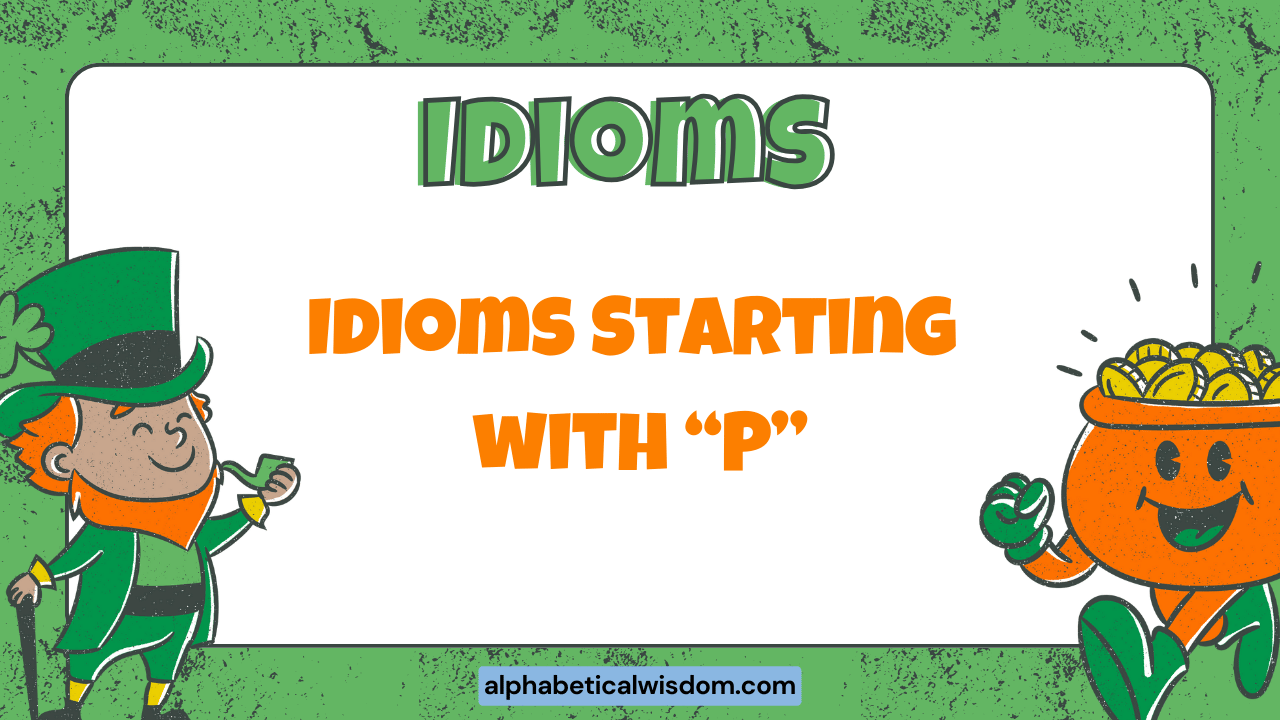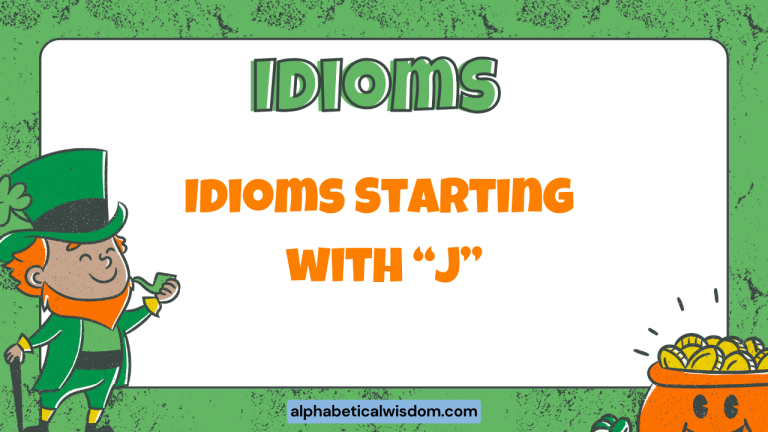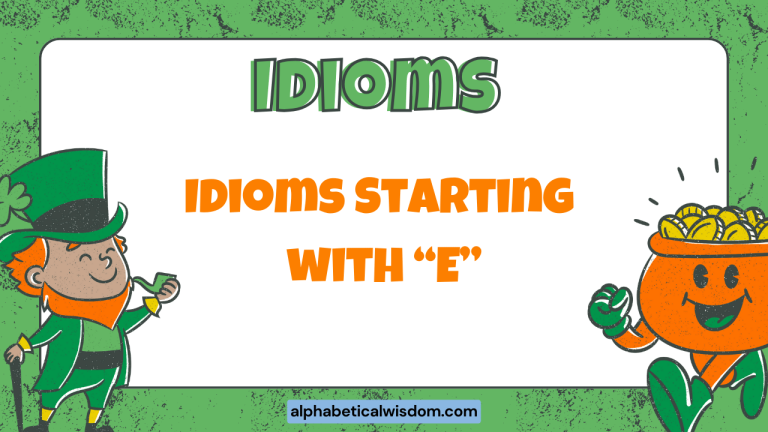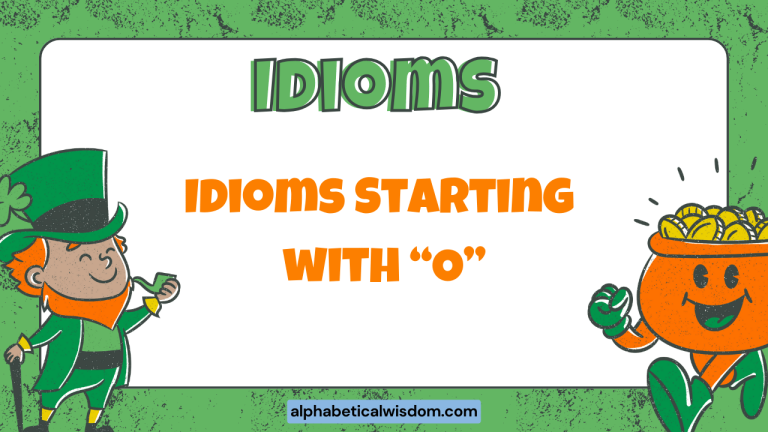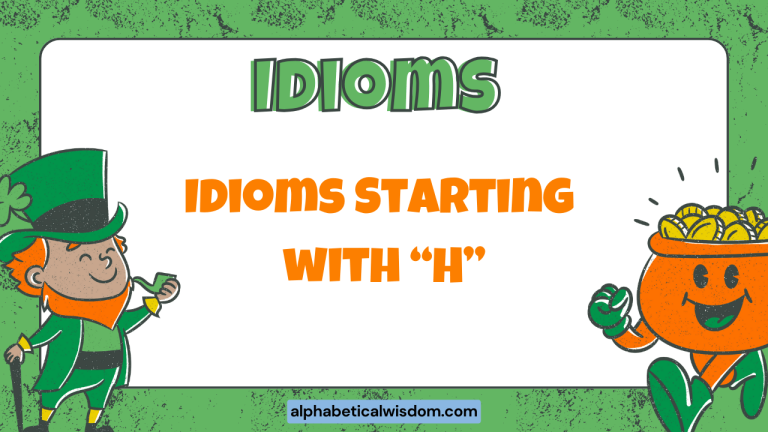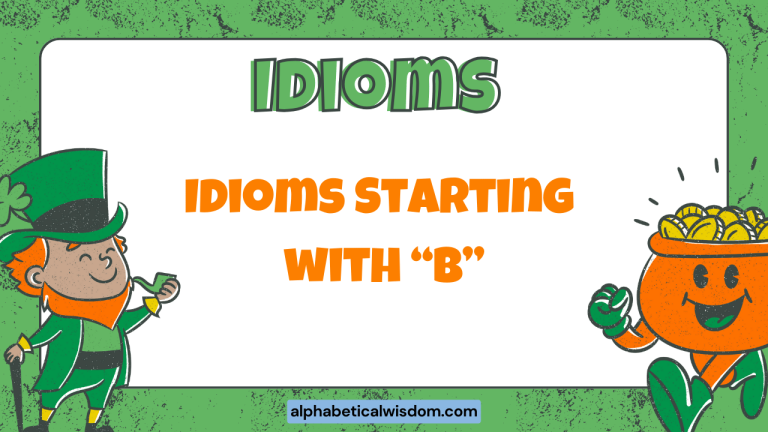Mastering Idioms: A Comprehensive Guide to Idioms Starting with ‘P’
Idioms are the spice of the English language, adding color, depth, and a touch of local flavor to your communication. Understanding idioms, particularly those starting with the letter ‘P,’ is crucial for comprehending native speakers and expressing yourself more vividly.
This article provides a comprehensive guide to common idioms starting with ‘P,’ breaking down their meanings, origins, and usage, making them accessible to learners of all levels. Whether you’re a beginner striving to understand basic conversations or an advanced speaker aiming to refine your English, this guide will significantly enhance your understanding and usage of idiomatic expressions.
Table of Contents
- Introduction
- What is an Idiom?
- Structural Breakdown of Idioms
- Categories of Idioms Starting with ‘P’
- Examples of Idioms Starting with ‘P’
- Usage Rules for Idioms Starting with ‘P’
- Common Mistakes When Using Idioms Starting with ‘P’
- Practice Exercises
- Advanced Topics: The Nuances of Idiomatic Usage
- Frequently Asked Questions
- Conclusion
What is an Idiom?
An idiom is a phrase or expression whose meaning cannot be understood from the literal meanings of its individual words. Instead, it has a figurative meaning that is known through common use.
Idioms are a fundamental part of any language, enriching communication and providing a deeper understanding of the culture and history behind the language. They are often culturally specific, reflecting the unique experiences and perspectives of a particular community.
In essence, idioms function as a type of linguistic shorthand. They allow speakers to convey complex ideas or emotions in a concise and memorable way.
Understanding idioms is not just about knowing the individual words; it’s about grasping the underlying concept or message that the phrase is intended to convey. This often requires familiarity with the cultural context in which the idiom is used.
Structural Breakdown of Idioms
Idioms can take various structural forms. They can be verb phrases, noun phrases, adjective phrases, or even entire clauses.
The key characteristic that defines them as idioms is their non-literal meaning. The structure of an idiom is fixed; changing the words or their order can destroy the idiom’s meaning and make the phrase nonsensical.
For example, the idiom “pass the buck” is a verb phrase. It means to avoid responsibility by passing it on to someone else. The structure of this idiom is fixed; you cannot say “pass the deer” or “throw the buck” and retain the same meaning. The specific combination of words is crucial to the idiom’s identity.
Another example is “piece of cake,” which is a noun phrase. It means something is very easy. Again, altering the phrase, such as saying “slice of cake,” changes the meaning entirely.
Categories of Idioms Starting with ‘P’
Idioms starting with ‘P’ can be categorized based on their meaning or the situation in which they are used. Here are a few broad categories:
Idioms Related to Effort or Difficulty
These idioms describe how easy or difficult something is.
Idioms Related to Truth or Deception
These idioms describe honesty or dishonesty.
Idioms Related to Time
These idioms involve time-related concepts.
Idioms Related to Emotions
These idioms express feelings or emotional states.
Examples of Idioms Starting with ‘P’
Below are various examples of idioms starting with ‘P,’ categorized by their connotation. Each table provides the idiom, its meaning, and an example sentence to illustrate its usage.
Positive Connotations
This table showcases idioms with positive meanings, often used to express approval, happiness, or success.
| Idiom | Meaning | Example Sentence |
|---|---|---|
| Paint the town red | Go out and celebrate exuberantly. | After winning the championship, the team decided to paint the town red. |
| Piece of cake | Very easy. | The exam was a piece of cake for her. |
| Pack a punch | To be surprisingly effective or powerful. | That small car really packs a punch. |
| Put your best foot forward | To make the best possible impression. | He wanted to put his best foot forward at the interview. |
| Play your cards right | To act wisely to get a good result. | If you play your cards right, you could get a promotion. |
| Proud as a peacock | Very proud and vain. | She was as proud as a peacock after winning the award. |
| Pure as the driven snow | Completely innocent and virtuous. | He claimed to be as pure as the driven snow, but no one believed him. |
| Perfect storm | The worst possible situation. | The combination of bad weather and high tides created a perfect storm. |
| Pass with flying colors | To succeed easily and impressively. | She passed with flying colors and got an A+ on her test. |
| Pick up the pieces | To recover from a difficult situation. | After the scandal, it took him a long time to pick up the pieces. |
| Put someone on a pedestal | To admire someone excessively. | She puts her father on a pedestal and thinks he can do no wrong. |
| Path of least resistance | The easiest way to do something. | He chose the path of least resistance and took the easy route. |
| Pleased as punch | Extremely pleased. | He was as pleased as punch when he heard the good news. |
| Pretty penny | A large sum of money. | That car cost him a pretty penny. |
| Power behind the throne | Someone who influences decisions without holding an official position. | She is the power behind the throne, advising the CEO on all major decisions. |
| Promise the moon | To make extravagant promises. | Politicians often promise the moon during election campaigns. |
| Pull out all the stops | To do everything possible to succeed. | They pulled out all the stops to make the party a success. |
| Put your money where your mouth is | To back up your words with action. | If you believe in the project, put your money where your mouth is and invest. |
| Push the envelope | To go beyond the limits of what is considered normal or acceptable. | The artist is known for pushing the envelope with his controversial work. |
| Put your shoulder to the wheel | To work hard and diligently. | If we all put our shoulder to the wheel, we can finish the project on time. |
| Play a blinder | To perform exceptionally well. (British English) | He played a blinder in the match and scored three goals. |
| Plain sailing | Easy and without problems. | After the initial difficulties, it was plain sailing. |
| Pop the question | To propose marriage. | He is planning to pop the question on their anniversary. |
| Put on the map | To make a place or person famous or important. | The film put the small town on the map. |
| Pen is mightier than the sword | Words and writing are more effective than violence. | The journalist believed that the pen is mightier than the sword. |
Negative Connotations
This table includes idioms with negative meanings, often used to express disapproval, sadness, or failure.
| Idiom | Meaning | Example Sentence |
|---|---|---|
| Pass the buck | Avoid responsibility by passing it to someone else. | The manager always tries to pass the buck when something goes wrong. |
| Penny-pinching | Being extremely frugal or miserly. | The company’s penny-pinching policies are hurting employee morale. |
| Pick a fight | To deliberately start an argument or conflict. | He is always trying to pick a fight with his brother. |
| Pull the plug | To stop something, usually funding or support. | The investors decided to pull the plug on the project. |
| Pay through the nose | To pay a very high price. | We had to pay through the nose for the concert tickets. |
| Pain in the neck | Someone or something that is annoying or troublesome. | Dealing with customer complaints is a real pain in the neck. |
| Pot calling the kettle black | Criticizing someone for a fault you have yourself. | It’s the pot calling the kettle black when he accuses me of being lazy. |
| Pour oil on troubled waters | To try to calm a difficult situation. | She tried to pour oil on troubled waters during the argument. |
| Prickly as a cactus | Easily offended or bad-tempered. | He’s been as prickly as a cactus ever since he lost his job. |
| Pushing up daisies | To be dead and buried. | If he doesn’t take care of himself, he’ll be pushing up daisies soon. |
| Par for the course | What is normal or expected, usually something negative. | The delays are par for the course with this project. |
| Pay the piper | To face the consequences of one’s actions. | Eventually, he will have to pay the piper for his dishonesty. |
| Pin your hopes on | To rely on someone or something for success. | Don’t pin all your hopes on winning the lottery. |
| Plague like the pest | To annoy or bother someone constantly. | The salesman plagued me like the pest with his phone calls. |
| Play with fire | To do something dangerous or risky. | You’re playing with fire if you lie to your boss. |
| Poison pen letter | An anonymous letter intended to harm someone’s reputation. | She received a poison pen letter filled with false accusations. |
| Promise the earth | To make extravagant promises that are unlikely to be kept. | He promised the earth to get her to invest in his company. |
| Pull the wool over someone’s eyes | To deceive someone. | He tried to pull the wool over my eyes, but I saw through his lies. |
| Punch below the belt | To do something unfair or unsportsmanlike. | Criticizing his family was a punch below the belt. |
| Put the cart before the horse | To do things in the wrong order. | You’re putting the cart before the horse by planning the party before you have a venue. |
| Part company | To disagree and end a relationship or association. | They parted company after years of working together. |
| Pass away | To die. (Euphemism) | Her grandmother passed away peacefully in her sleep. |
| Penny wise, pound foolish | Careful about small amounts of money but wasteful with large amounts. | He’s penny wise, pound foolish, always saving on small things but wasting money on big purchases. |
| Play fast and loose | To behave irresponsibly or dishonestly. | He plays fast and loose with the company’s finances. |
| Prove a point | To demonstrate something, often by doing something extreme or risky. | He drove recklessly to prove a point. |
Neutral Connotations
This table includes idioms that are neither particularly positive nor negative, often used to describe situations or actions in a neutral way.
| Idiom | Meaning | Example Sentence |
|---|---|---|
| Play it by ear | To improvise or decide how to proceed as things develop. | We don’t have a set plan; we’ll just play it by ear. |
| Put on hold | To postpone or delay something. | The project has been put on hold due to lack of funding. |
| Push your luck | To take a risk that could lead to negative consequences. | You’re pushing your luck by driving so fast in this weather. |
| Pay attention | To listen carefully or observe closely. | You need to pay attention in class if you want to understand the material. |
| Pick up | To learn something new or improve. | She picked up Spanish quickly after moving to Spain. |
| Part and parcel | An essential or integral part of something. | Stress is part and parcel of being a doctor. |
| Pass muster | To meet the required standards or qualifications. | His proposal didn’t pass muster with the committee. |
| Pat yourself on the back | To congratulate yourself. | You deserve to pat yourself on the back for all your hard work. |
| Pin down | To determine or establish something precisely. | It’s difficult to pin down the exact cause of the problem. |
| Platitude | A trite or meaningless statement. | His speech was filled with empty platitudes. |
| Pound the pavement | To walk or search extensively. | He had to pound the pavement for weeks before he found a job. |
| Present arms | A military salute. | The soldiers presented arms as the general arrived. |
| Press the flesh | To shake hands with people, especially during a political campaign. | The candidate spent the day pressing the flesh at the rally. |
| Pull a rabbit out of a hat | To do something unexpected or surprising, often to solve a problem. | He managed to pull a rabbit out of a hat and save the deal. |
| Pull strings | To use influence to get something done. | He had to pull strings to get his son into the school. |
| Put in your two cents | To offer your opinion or contribution. | I just wanted to put in my two cents on the matter. |
| Put on airs | To behave as if you are superior to others. | She started to put on airs after she became famous. |
| Put out feelers | To make discreet inquiries or suggestions. | They put out feelers to see if anyone was interested in buying the company. |
| Paper over the cracks | To hide problems without solving them. | The new coat of paint only papered over the cracks in the old building. |
| Pass the time | To spend time doing something. | We passed the time playing cards. |
| People who live in glass houses shouldn’t throw stones | Don’t criticize others if you have similar faults. | He shouldn’t criticize her driving; people who live in glass houses shouldn’t throw stones. |
| Pinch and a punch, first of the month | A traditional saying on the first day of the month. | “Pinch and a punch, first of the month!” he exclaimed on October 1st. |
| Play cat and mouse | To tease or torment someone by pretending to let them go free. | The detective played cat and mouse with the suspect during the interrogation. |
| Pour scorn on | To show contempt for. | The critics poured scorn on the new play. |
| Pull rank | To use your position or authority to get what you want. | He pulled rank to get the best parking spot. |
Usage Rules for Idioms Starting with ‘P’
Using idioms correctly requires understanding their specific contexts and nuances. Here are some general guidelines:
- Context is Key: Always consider the context of the conversation or writing. An idiom that is appropriate in one situation may be completely out of place in another.
- Know Your Audience: Be mindful of your audience’s familiarity with idioms. Using too many idioms, especially obscure ones, can confuse or alienate your listeners or readers.
- Avoid Overuse: While idioms can add color to your language, overuse can make your speech sound unnatural or forced. Use them sparingly and purposefully.
- Maintain Grammatical Consistency: Ensure that the idiom fits grammatically within the sentence. For example, if the idiom is a verb phrase, make sure it agrees with the subject in number and tense.
It’s important to remember that idioms are not always direct translations. For instance, the idiom “piece of cake” does not literally mean a slice of cake; it signifies something easy. Understanding the figurative meaning is crucial for proper usage.
Common Mistakes When Using Idioms Starting with ‘P’
One of the most common mistakes is taking idioms literally. This can lead to misunderstandings and humorous errors.
Another frequent error is altering the words of the idiom, which can change the meaning or make the phrase nonsensical. Here are some examples of common mistakes:
| Incorrect | Correct | Explanation |
|---|---|---|
| He passed the deer. | He passed the buck. | “Pass the buck” means to avoid responsibility. “Pass the deer” has a literal meaning. |
| She paid through her nose. | She paid through the nose. | The correct idiom is “pay through the nose,” meaning to pay a very high price. |
| They are pulling my leg’s. | They are pulling my leg. | The idiom is “pulling my leg,” meaning to tease or joke with someone. |
| He is painting the city red. | He is painting the town red. | The idiom is “paint the town red,” meaning to celebrate exuberantly. |
| It’s a slice of cake. | It’s a piece of cake. | The idiom is “piece of cake,” meaning something is very easy. |
Practice Exercises
Test your understanding of idioms starting with ‘P’ with these exercises. Choose the correct idiom to complete each sentence.
| Question | Options | Answer |
|---|---|---|
| 1. He always tries to ______ when something goes wrong. | a) pass the deer b) pass the buck c) pass the book | b) pass the buck |
| 2. The exam was a ______. | a) piece of pie b) piece of cake c) piece of bread | b) piece of cake |
| 3. They decided to ______ after winning the game. | a) paint the house red b) paint the city red c) paint the town red | c) paint the town red |
| 4. You’re ______ by driving so fast. | a) pushing your luck b) pushing your car c) pushing your limits | a) pushing your luck |
| 5. He had to ______ for the concert tickets. | a) pay through the mouth b) pay through the nose c) pay through the ear | b) pay through the nose |
| 6. Don’t ______ on winning the lottery. | a) pin your hopes on b) pin your dreams on c) pin your wishes on | a) pin your hopes on |
| 7. She is always trying to ______ with her brother. | a) pick a flower b) pick a fight c) pick a bone | b) pick a fight |
| 8. After the scandal, it took him a long time to ______. | a) pick up the flowers b) pick up the toys c) pick up the pieces | c) pick up the pieces |
| 9. We don’t have a plan, we’ll just ______. | a) play it by the guitar b) play it by the piano c) play it by ear | c) play it by ear |
| 10. She tried to ______ during the argument. | a) pour water on troubled waters b) pour oil on troubled waters c) pour juice on troubled waters | b) pour oil on troubled waters |
Exercise 2: Fill in the blanks with the correct idiom.
| Question | Answer |
|---|---|
| 1. The company’s __________ policies are hurting employee morale. | penny-pinching |
| 2. Dealing with customer complaints is a real __________. | pain in the neck |
| 3. He’s been as __________ ever since he lost his job. | prickly as a cactus |
| 4. Eventually, he will have to __________ for his dishonesty. | pay the piper |
| 5. The delays are __________ with this project. | par for the course |
| 6. Stress is __________ of being a doctor. | part and parcel |
| 7. You deserve to __________ for all your hard work. | pat yourself on the back |
| 8. It’s difficult to __________ the exact cause of the problem. | pin down |
| 9. He had to __________ for weeks before he found a job. | pound the pavement |
| 10. The candidate spent the day __________ at the rally. | pressing the flesh |
Advanced Topics: The Nuances of Idiomatic Usage
For advanced learners, understanding the subtle nuances of idiomatic usage is crucial. This includes recognizing regional variations, historical origins, and the evolving nature of idioms.
Some idioms are more common in certain regions or dialects of English, while others may have historical roots that are not immediately apparent. For instance, British English and American English often have different idioms for the same concept.
Furthermore, idioms are not static; they evolve over time. New idioms emerge, while others fall out of use.
Keeping up with these changes requires continuous exposure to the language and culture. Reading contemporary literature, watching movies and TV shows, and engaging in conversations with native speakers are all excellent ways to stay current with idiomatic usage.
Another advanced aspect is the ability to use idioms creatively and playfully. While it’s important to use idioms correctly, skilled speakers and writers can also manipulate them for rhetorical effect.
This might involve slightly altering the idiom to create a humorous or ironic twist, or combining multiple idioms to create a more vivid and memorable image. However, this requires a deep understanding of the idioms and a keen sense of linguistic creativity.
Frequently Asked Questions
Here are some frequently asked questions about idioms starting with ‘P’:
- What is the best way to learn idioms?
The most effective way to learn idioms is through exposure and context. Read widely, listen to native speakers, and pay attention to how idioms are used in different situations. Keep a notebook of new idioms and try to use them in your own speech and writing.
- Are idioms the same in all English-speaking countries?
No, idioms can vary significantly between different English-speaking countries. For example, some idioms are more common in British English than in American English, and vice versa. Be aware of these regional variations when using idioms.
- Can I create my own idioms?
While it’s possible to create new phrases, they are not considered idioms until they gain widespread use and acceptance. Idioms are, by definition, expressions that are commonly understood and used within a language community.
- How can I avoid misusing idioms?
The best way to avoid misusing idioms is to understand their meaning and context thoroughly. Before using an idiom, make sure you know what it means and how it is typically used. If you are unsure, it’s better to use a more straightforward expression.
- Are there any resources that can help me learn idioms?
Yes, there are many resources available, including idiom dictionaries, online quizzes, and language learning apps. Look for resources that provide examples of idioms in context and offer opportunities to practice using them.
- Why are idioms so difficult to understand?
Idioms are difficult to understand because their meaning is not literal. You cannot deduce the meaning of an idiom simply by knowing the meanings of its individual words. Instead, you need to learn the figurative meaning of the entire phrase.
- Is it important to use idioms when speaking English?
While it’s not essential to use idioms, doing so can make your English sound more natural and fluent. Idioms can also help you express yourself more vividly and concisely. However, it’s important to use them correctly and appropriately.
- How can I tell if a phrase is an idiom?
If the meaning of a phrase is different from the literal meanings of its individual words, it is likely an idiom. You can also consult an idiom dictionary or ask a native speaker for clarification.
- What’s the difference between an idiom and a proverb?
While both idioms and proverbs are figurative expressions, they serve different purposes. Idioms are phrases whose meaning is not literal, while proverbs are short sayings that offer general advice or wisdom.
- How do I know which idioms are appropriate for formal situations?
In formal situations, it’s generally best to avoid using overly casual or colloquial idioms. Stick to more formal and widely understood expressions. When in doubt, err on the side of caution and use more straightforward language.
Conclusion
Mastering idioms starting with ‘P’ is a valuable step in achieving fluency and a deeper understanding of the English language. By understanding the definitions, structures, and usage rules of these idioms, learners can enhance their communication skills and connect with native speakers more effectively.
Remember to practice regularly, pay attention to context, and avoid common mistakes. With dedication and consistent effort, you can confidently incorporate these colorful expressions into your everyday conversations and writing.
Continue to expand your knowledge by exploring idioms starting with other letters of the alphabet and delving into the cultural contexts in which they are used. Embrace the richness and diversity of the English language, and enjoy the journey of mastering its idiomatic expressions.
The more you learn, the more nuanced and expressive your English will become.
